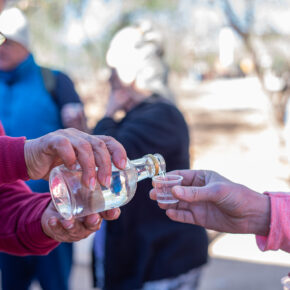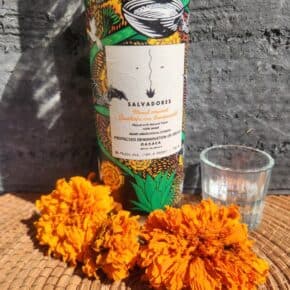Oaxaca is a southern state in Mexico with one of the largest indigenous populations. It has been trending as a top travel destination for several years. In November 2021, I did an IG live with artist and activist Favianna Rodriguez ahead of her first trip to Oaxaca. Much of the discussion was about being a more responsible traveler, particularly when visiting Indigenous communities. The suggestions below are from that conversation.
First, there is no such thing as responsible, ethical or sustainable tourism under capitalism, which reduces every interaction into a transaction. While tourism claims to support the local economy, the tradeoff is that it harms the environmental, social, and cultural fabric of host countries. Our behaviors have an impact on the earth and on the communities that have become reliant on tourism.
While the ideal would be to shut down the extractive tourism economy, the reality is that it’s not going to end anytime soon. But I do believe that there are some basic principles that should be honored by foreigners so they can be less crappy and also become more self-aware, unlearn ethnocentrism, and learn to recognize the nuances of power dynamics.
The decades that I was undocumented shaped my desire for a borderless world; a world where our innate curiosity to move, explore, and connect is nourished instead of policed. In our current reality, the disparate ability to move across socially-constructed borders has created a people who feel entitled to other peoples’ cultures. The suggestions below are an effort to stir reflection so foreigners can be a little less harmful.
- DO recognize that the mere ability to travel is a privilege that not everyone has. Even if someone experiences marginalization and oppression in the U.S., the ability to travel to other countries, especially with a U.S. passport and with U.S. dollars, puts them in a more privileged category. Some privileges include the affordance of services, hospitality, care, and access to places that sometimes native people can’t even access.
- DO leave the extra baggage back home. That is, the “American” rights and entitlement. Too often, foreigners fail to remember that they’re not in the U.S., a country that is individualistic, where the ‘customer is always right’, and where living in a bubble is the norm. These norms are not true all over the world. Don’t treat native people like they’re invisible or like they’re servants. It’s customary for native people to acknowledge each other with a hello, a wave, a smile, or “buen provecho” (translates to “enjoy your meal”). Part of showing love for a culture is mirroring the behaviors that make us feel seen, cared for, and acknowledged.
- DO learn and practice the most common language that’s spoken in the host country/region. The tourism economy is an extension of supremacy culture; Americans can travel almost anywhere in the world without needing to put in work to communicate with host communities. Put in some work and learn some basic Spanish while also recognizing that Spanish is a colonial language and that for many Indigneous communities, Spanish is a second language. Language creates meaning, values, beliefs, principles, and practices. Be open to experiencing a different world.
- DO redistribute monetary resources back to Indigenous peoples. The tourism economy often places intermediates between visitors and the people and places that host the tours. These intermediates, even if they’re from Oaxaca, don’t always have the community’s best interest at heart, and many don’t even belong to the communities they tour. If you get a tour guide, ask how much the host family keeps. Be generous, buy directly from producers, leave tips, and always carry cash!
- REMEMBER: Cultural practices aren’t always extended to foreigners. If it’s normal in the community to visit unannounced, it doesn’t grant visitors permission to do that. If you have a tour guide, make sure they’ve made reservations ahead of time. I’ve certainly heard mezcal producers share that people show up unannounced, even in groups. In mezcal producing communities, the palenques are often an extension of the family’s home, so they’re really opening their homes to strangers.
- DON’T take pictures without permission. When have you ever seen racialized people travel to Europe and get in the faces of white children, elders, and working people to take a picture? Sometimes it’s really about trying to put ourselves in others’ shoes. Avoid tokenizing Indigenous peoples. If they give you permission to take a picture and you share it on social media, tag them (if they have an account) and name them! I cannot emphasize the naming enough. We have names! And don’t forget to pay them, especially if those images are being used to promote your business, your work or just your page.
- DON’T use your large social media platform to trick people into treating you differently. The stories are real. Social media influencers will show their large following to people as a way to get free mezcal, art, merchandize etc. This is deceitful and upholds power dynamics. Social media also perpetuates the exotification of people and place by encouraging the proliferation of ‘instagrammable’ images. Before posting, ask yourself: does this image perpetuate a romanticized or dichotomous representation of Oaxaca? I know this is a big ask in the age of social media.
- DON’T be a savior. Remember to continue practicing cultural humility. We are not uncivilized poor people. Think global: our economic and cultural wealth is being stolen from us and the US (and other dominant countries) are playing a huge part in this theft. Instead, find the people in your circles that you can educate and share this (and other resources) with. Who are the close-minded, anti-Black, anti-Indigenous, xenophobic people and children who could benefit from unlearning saviorism. Go save them!
- DON’T launch a business using elements of Oaxaca or in Oaxaca. Unless your business plan centers the people whose culture you’re selling and there is a clear ownership and equity plan, just don’t. This suggestion is also for Mexicans who aren’t from Oaxaca who feel entitled to Oaxaca’s culture simply for being Mexican. For those who are unaware, racism, colorisms, and all the other isms present in the U.S. are also alive in Mexico. Oaxacans have been disenfranchised and discriminated against in our own state and country for having deep Indigenous roots. And now we are being commodified, often by our own Mexican relatives. The audacity and the irony.
- REMEMBER: You’re not an expert, in mezcal or anything related to Oaxaca, especially if you’re not from there or of the craft. I’ve seen folks in mezcal groups talk about the spirit like they’re experts and vouching for brands that actually do harm. I’ve also witnessed it in real life…in Oaxaca. The problem with this is that the storytellers, narrators, ambassadors, and “experts” become people without roots in Oaxaca, so what we get is a revisionist story of mezcal. At worse, we get Indigenous erasure.
- BONUS: DON’T BUY LAND IN OAXACA! This deserves its own piece, and we’ll definitely talk about this in depth in the future, but it needs to be named now. Interesting how even during the ‘land back’ movement in the U.S., tourists turned “expats”, of all colors and nationalities, talk about leaving the U.S. empire and buying land in Oaxaca. Perhaps this is a natural consequence of displacement, but without a clear strategy that centers Indigenous Oaxacan people, then I guess we’re choosing to mindlessly follow the blueprint of settler-colonialism. In which case, we should just own it and end the performative allyship.
In my ideal world, Oaxaca would be removed from the lists of top travel destinations and people would only travel if they have family and community rooted in those countries. Of course, that’s just a fantasy. But my hat goes off to the very few people I know who have made a commitment to not travel to foreign countries unless they’re invited. I admire this approach because being invited opens the possibility for more transformative cultural experiences.
I hope that these suggestions also sprout possibilities for cultural appreciation.












Thank you and there is some paradox I don’t remember about how to visit something without changing it since the act of visiting does just that. The exploitation of the locals from outside influence is sad to see. We get invited by locals from Oaxaca because of who we are. Maybe the tourist trap is a good thing in a way cause it keeps a good barrier. People can be just awful, so just stay on the bus and your hotel please, there are plenty in centro to con you. The beauty of our trips to Oaxaca is beyond that barrier to the real people. Take your work boots and do a hard days work on the farm or palenque. This is what I do.